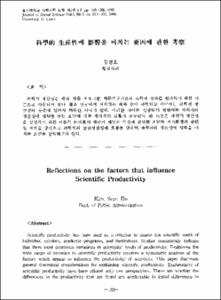THE SIGNIFICANCE AND METHODOLOGY OF PROBLEM STRUCTURING IN PUBLIC POLICY MAKING
- Alternative Title
- 公共政策決定에 있어서 問題構造化의 重要性과 方法
- Abstract
- 모든 계층의 수많은 이해집단이 제한된 자원에 대하여 끊임없는 경쟁을 벌이고 ?獵? 정책결정상황하에서 문제의 구조화는 정책결정의 모든 단계에서 이루어 지고 있다. 다양한 이해관계집단은 같은 문제상황을 다르게 그리고 흔히 대립되게 정의하고 있고 분석가를 동원하여 대안을 만들고 대안평가를 위하여 다양한 방법을 적용하고 있다. 실증주의적 전통에 있어서는 문제가 먼저 정의되고 목표가 결정되면 그에 대한 대안이 마련되고 각 대안과 그 영향에 대한 평가가 이루어지고 마지막으로 최선의 대안이 선택된다. 그러나 후 기실증주의적 접근법에서는 문제에 대한 정의를 강조함으로써 문제상황으로부터 다양하고 가능한 모든 개념을 추상화하고 통합하고 그 다음 여러 대안을 평가하기 위한 사회과학적 절차를 적용하여 궁극적으로 집행을 위한 최선의 정책을 선택하게 된다. 많은 사람들은 대부분의 중요한 정책들이 구조화가 잘 되어 있지 않다고 믿고 있기 때문에 정책결정과 정책분석의 가장 중요한 측면은 문제의 구조화라고 생각하고 있다. 따라서 정책분석이론은 보다 향상된 문제형성에 기여를 해야 할 뿐만 아니라 틀린 문제를 풀게 됨으로써 발생하는 오류를 감소시켜야 한다. 본 논문은 문제의 구조화에 있어서 제3종오류의 원천을 식별하고 감소시키기 위한 방법을 논한다.
In current policy making, with the myriad of special interest groups at all levels and the constant competition for limited resources, the problem structuring at all stages of policy making does occur. Various stakeholder groups define a common problematic situation in different and often opposing ways. These same interest groups employ diverse analysts to generate alternatives and then apply diverse methods to assess these alternatives. In the positivist tradition, a problem is simply defined and a procedure is implemented to determine goals or objectives, generate alternatives, evaluate the alternatives and their impacts and finally choose the best alternative. However, the post-positivistic approach stresses the goal of defining the problem by abstracting and integrating various possible conceptions out of the problematic situation, and then applying social science procedures to evaluate various alternatives and ultimately choose the best policy for implementation. Many believe that the most critical aspect of policy making and policy analysis is problem structuring because many of the most important policy problems are ill-structured. An appropriate theory of policy analysis should not only contribute to improved formulations of a problem; it should also reduce the probability of errors that result from answering the wrong policy question. This paper identifies the major source of error in problem structuring, i.e., type Ⅲ errors, and discusses methods and techniques that attempt to avoid typeⅢ errors.
In current policy making, with the myriad of special interest groups at all levels and the constant competition for limited resources, the problem structuring at all stages of policy making does occur. Various stakeholder groups define a common problematic situation in different and often opposing ways. These same interest groups employ diverse analysts to generate alternatives and then apply diverse methods to assess these alternatives. In the positivist tradition, a problem is simply defined and a procedure is implemented to determine goals or objectives, generate alternatives, evaluate the alternatives and their impacts and finally choose the best alternative. However, the post-positivistic approach stresses the goal of defining the problem by abstracting and integrating various possible conceptions out of the problematic situation, and then applying social science procedures to evaluate various alternatives and ultimately choose the best policy for implementation. Many believe that the most critical aspect of policy making and policy analysis is problem structuring because many of the most important policy problems are ill-structured. An appropriate theory of policy analysis should not only contribute to improved formulations of a problem; it should also reduce the probability of errors that result from answering the wrong policy question. This paper identifies the major source of error in problem structuring, i.e., type Ⅲ errors, and discusses methods and techniques that attempt to avoid typeⅢ errors.
- Issued Date
- 1995
- Type
- Research Laboratory
- Alternative Author(s)
- 김선호
- Publisher
- 사회과학논집
- Language
- eng
- Rights
- 울산대학교 저작물은 저작권에 의해 보호받습니다.
- Citation Volume
- 5
- Citation Number
- 2
- Citation Start Page
- 127
- Citation End Page
- 142
- Appears in Collections:
- Research Laboratory > Journal of social science
- 파일 목록
-
-
Download
 000002023893.pdf
기타 데이터 / 696.04 kB / Adobe PDF
000002023893.pdf
기타 데이터 / 696.04 kB / Adobe PDF
-
Items in Repository are protected by copyright, with all rights reserved, unless otherwise indicated.